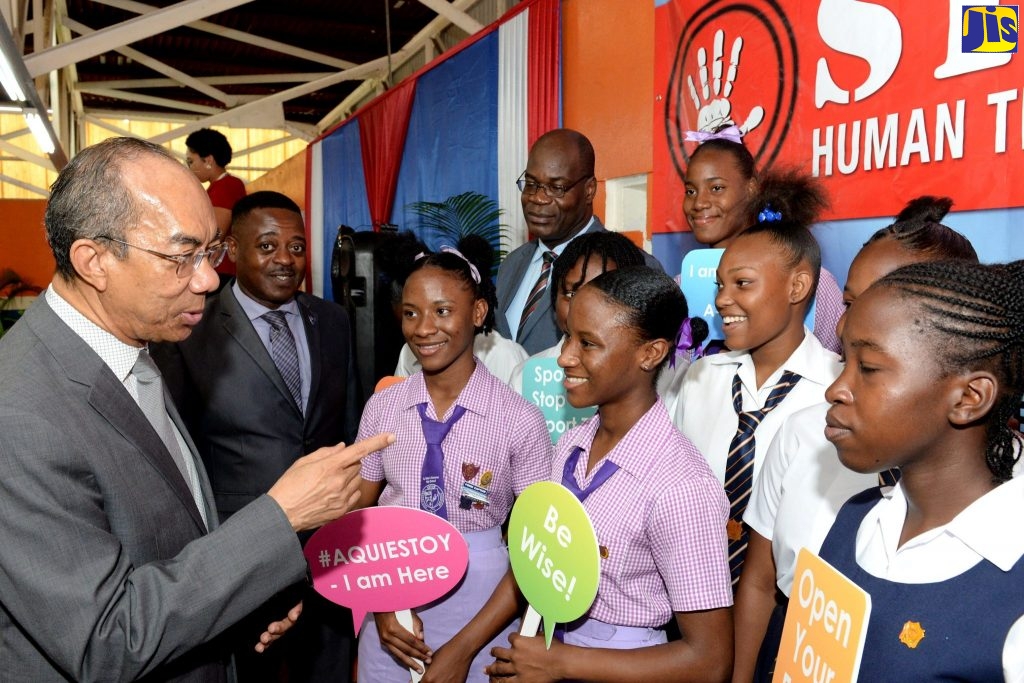Jamaica Cracking Down on Human Traffickers
By: , October 18, 2019The Key Point:
The Facts
- Deputy Commissioner of Police (DCP) in charge of crime, Fitz Bailey, tells JIS News that the Anti-Trafficking in Persons Unit has rescued 96 victims since its establishment in 2005.
- In addition, some 36 persons have been arrested and charged with human trafficking and related offences.
The Full Story
Jamaica continues to make strides in rescuing victims of human trafficking and securing convictions against offenders.
Deputy Commissioner of Police (DCP) in charge of crime, Fitz Bailey, tells JIS News that the Anti-Trafficking in Persons Unit has rescued 96 victims since its establishment in 2005.
In addition, some 36 persons have been arrested and charged with human trafficking and related offences.
“We have secured several convictions through the courts and we continue to conduct training and workshops locally and internationally,” he says.
Between 2010 and 2018, more than 750 anti-trafficking operations were conducted, resulting in 82 victims being rescued, 30 suspected traffickers arrested, and the dismantling of three prostitution rings.
Head of the Anti-Trafficking in Persons Vice Squad, Deputy Superintendent of Police (DSP) Carl Berry, tells JIS News that persons have been charged and convicted of offences directly related to human trafficking such as rape, forced labour, forced begging, child trafficking and sex trafficking.
He says there have been other convictions “for offences akin to human trafficking, meaning things that are not totally human trafficking, but were done within the course of the activity.”
DSP Berry says that the 96 persons, who have been rescued, include children from Honduras, males from Italy, a female from China as well as locals.
“We have assisted in the rescue of victims, who are non-nationals, who were trafficked in other countries,” he notes.
Human trafficking is described as a modern-day form of slavery. It is the recruitment, transportation, transfer, harbouring or receipt of persons by improper means (such as force, abduction, fraud, or coercion) for an improper purpose, including forced labour or sexual exploitation.
Human trafficking is recognised as a global organised criminal activity and is one of the most heinous and lucrative crimes.
Women and girls account for 71 per cent of the vast majority of all trafficking victims.
They can be found in massage parlours, escort services, bars and strip clubs, resort areas, hotels and nightclubs, some homes, hair and nail salons; and engaged in agricultural work, drug sales and cultivation, restaurants, commercial sex areas, pornography, forced begging situations, among others.
DCP Bailey says it is globally accepted that human trafficking has the potential to create several negative outcomes for a country and its people, if it is allowed to exist, grow and expand.
He notes that the crime has the ability to destabilise a country resulting in increased transnational criminal activities, suicide, health risks, corruption, crime and violence, and general social decay.
Jamaica is taking a zero-tolerance approach to the issue through strengthening the legislative framework to punish traffickers, and undertaking a robust public education campaign and training initiatives aimed at preventing persons from becoming victims.

There is also a National Task Force Against Trafficking in Persons (NATFATIP), which was established in 1995, to monitor and coordinate responses to human trafficking.
A trafficking in persons curriculum was developed for secondary schools in 2015, and an Anti–Trafficking in Persons Clubs in school initiative was launched in October.
The country belongs to a family of nations that has ratified the United Nations Protocol to Prevent, Suppress and Punish Trafficking in Persons Especially Women and Children, and is the first within CARICOM to have created a special unit within the law enforcement architecture to address the scourge.
DCP Bailey says it is recognised that vulnerable individuals caught up in the crime of human trafficking require urgent law enforcement intervention and so the unit, which is staffed by specially trained police investigators, is ensuring that human traffickers “are pursued with an increased level of vigour.”
“This shows the commitment on the part of the (Government) to ensure that the law enforcement framework is equipped and remains committed to tackle the crime of human trafficking,” he says.
Meanwhile, DSP Berry is encouraging Jamaicans to play their part in addressing the scourge by looking out for signs of human trafficking as victims do not often come forward.
“This is one of the few crimes in the world where self-reporting is not an activity. I am yet to see victims coming forward… you rarely ever see victims of human trafficking reporting and it is because of several things we have observed,” he tells JIS News.
He notes that many victims have developed a Stockholm syndrome-like attachment to their captors, where they bond, identify, or sympathise with them.
“Because of that they are less likely to report on those who abuse them. Another factor we notice is fear. People are fearful to face criminals… and they would have witnessed some atrocious acts and they don’t want to be the next [victim] so they don’t report,” DSP Berry says.
He notes that a once jovial person, who has become withdrawn and has stopped participating in activities, could be a human trafficking victim.
“It doesn’t mean it’s human trafficking but it means that something is happening. Look for untreated wounds, look for signs of a person being tied up and beaten up. Those include scars on the wrist left behind by ropes or wires. We also ask people to look in their communities as the sad thing about human trafficking is that it exists almost everywhere,” he notes.
Jamaica retained a Tier 2 ranking in the latest human trafficking report published by the United States State Department and is putting measures in place to improve the ranking.
Persons can report suspected cases of human trafficking by calling 311, 119, 876-967-1389 or 876-922-2373.




